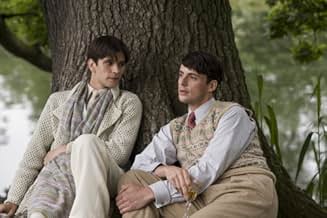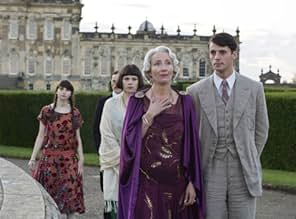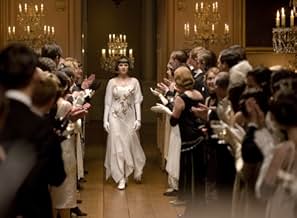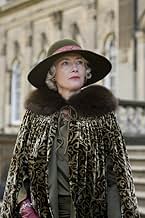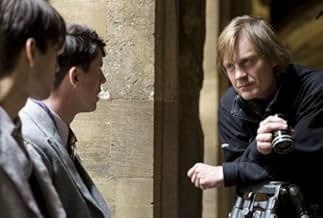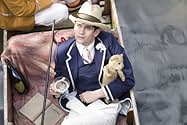IMDb RATING
6.6/10
14K
YOUR RATING
A poignant story of forbidden love and the loss of innocence set in England prior to World War II.A poignant story of forbidden love and the loss of innocence set in England prior to World War II.A poignant story of forbidden love and the loss of innocence set in England prior to World War II.
- Director
- Writers
- Stars
- Awards
- 11 nominations total
- Director
- Writers
- All cast & crew
- Production, box office & more at IMDbPro
Featured reviews
Every once in a few decades something like Brideshead comes along. No wonder anyone would want to try to relive that magic! So now there is Brideshead the movie. That means the director had to grasp the original TV show in two hours, so no other choice than a 'The Best Of' compilation remains, it seems.The disadvantage of it is, that what is left out suddenly becomes painfully missing.
All of us who have watched the TV series know it is virtually impossible to surpass it, in film or TV production. Nevertheless, I tried to watch it without prejudice. Overall not a bad movie, but no, not the magical resonance the original had.
All I can do is summarize in details the pluses and minuses of the film versus the TV production so here it goes:
The fathers from original were two of the best actors of the century; John Geilgud (Shakespeare) and the (incomparable) Laurence Olivier. Geilgud plays brilliantly the teasing but not totally indifferent father, who seems stop Charles from the insipid surroundings in the summer but finally lets him go. In the TV series the actor is more serious, and the fun is not there. Laurence had probably one of the best performances of all, and clearly echoes his naughtiness as he portrayed in A Little Romance then a few years earlier. His unpredictability which finally makes him decide for his daughter is well done, especially considered his playground was virtually no more than a static death bed! And then the scene where he is offered a ride in a car down the steps, which he refuses since he doesn't want to admit it might be his last.
Matthew Goode does quite a good job as a substitute of Jeremy Irons. I like especially his ambivalent apparition (homosexual, heterosexual, both, or doesn't it matter?). But he lacks the wonderful narrating voice of Irons, which research has shown to be one of the best around. In the film the romance between Charles and Sebastian's sister is elaborated much more. Partially I agree with this choice. In the original not enough scenes were implanted for credibility, except probably the scene where Charles lights her cigarette. They were virtually strangers meeting again on the cruiser years later and nevertheless they seemed to suddenly hit it off. The sister was not what stood Charles' and Sebastian's friendship in the way. The filmmakers choose for more stress on their impending romance. I think the TV original did this better; it was the family that Charles became part of, and Sebastian's indifference to love that became unsurpassable problems. In original the mother was almost invisible, with the exception of some quotes on her son like 'I don't understand it', which summed it all up. We do not need the dialog in the film where she explains herself, and wonders why her kids hate her. Understatement is much more powerful, also in the scene 'I'll say no more' between Charles and Julia, in which it becomes clear religion has driven them apart. One sentence can be enough.
All this was at the cost of stress Sebastian could have had, and got in the TV original. Most of the magic of Brideshead was simply Anthony Andrews' performance. Worse, the movie clearly alludes to a homosexual relationship, which it did not need to be. Sebastian was a love object, and could be loved by anyone, in any way. But then again, it might be hard finding someone that could deliver the line about Sebastian as Irons narrated: 'his beauty, arresting'. Charm was the problem, the danger. That missed in this film. It was charm that nearly got Charles astray, as told by the queer friend years later in his atelier. The film omitted this important scene, where that friend tried to warn Charles for Sebastian. At the time we all thought it was a nasty remark, but later on he seemed to be right. Or was the charm not an illusion after all? The film simply did not have enough time to build up the charm Sebastian surely had in the TV original. In the TV series Charles was shown first with boring friends, and it then became shortly a coming of age story, where he got introduced in a more fun crowd with Sebastian. This phase delivered some of the best scenes of the story, with his queer friend talking loud over the campus, or Sebastian dressing up as a man with mustache. Sebastian showed Charles other worlds, which real or not, were unforgettable. The film had to rush this too much, and therefore the introduction scene with the spring eggs lost its magic.
One of the few pluses was much less stress on Cordelia, the little girl. But the minus was she acted as an indirect narrator of the importance of religion. Now it had to be compensated for in dialog with the mother and Julia, which was in TV better since there meaning came out of things not said.
Many things I missed, but you can not cram all in two hours. But lines like 'I would like to remember Sebastian, how he were that summer, when we walked through the enchanted place' should have been told again.
The end was nicely done, with Charles finally not pinching candlelight, symbolic for the charm of that family that was still alive in him. I liked there the Irons narrative though 'Was it all vanity? Etc.'
I would say, it was a brave attempt, something like making a remake of 2001, or Casablanca or Breakfast at Tiffany's, and the acting was all well done. Also camera work, and story adaptation. But who can surpass Anthony Andrews, or Jeremy Irons, or Gielgud or Olivier?
All of us who have watched the TV series know it is virtually impossible to surpass it, in film or TV production. Nevertheless, I tried to watch it without prejudice. Overall not a bad movie, but no, not the magical resonance the original had.
All I can do is summarize in details the pluses and minuses of the film versus the TV production so here it goes:
The fathers from original were two of the best actors of the century; John Geilgud (Shakespeare) and the (incomparable) Laurence Olivier. Geilgud plays brilliantly the teasing but not totally indifferent father, who seems stop Charles from the insipid surroundings in the summer but finally lets him go. In the TV series the actor is more serious, and the fun is not there. Laurence had probably one of the best performances of all, and clearly echoes his naughtiness as he portrayed in A Little Romance then a few years earlier. His unpredictability which finally makes him decide for his daughter is well done, especially considered his playground was virtually no more than a static death bed! And then the scene where he is offered a ride in a car down the steps, which he refuses since he doesn't want to admit it might be his last.
Matthew Goode does quite a good job as a substitute of Jeremy Irons. I like especially his ambivalent apparition (homosexual, heterosexual, both, or doesn't it matter?). But he lacks the wonderful narrating voice of Irons, which research has shown to be one of the best around. In the film the romance between Charles and Sebastian's sister is elaborated much more. Partially I agree with this choice. In the original not enough scenes were implanted for credibility, except probably the scene where Charles lights her cigarette. They were virtually strangers meeting again on the cruiser years later and nevertheless they seemed to suddenly hit it off. The sister was not what stood Charles' and Sebastian's friendship in the way. The filmmakers choose for more stress on their impending romance. I think the TV original did this better; it was the family that Charles became part of, and Sebastian's indifference to love that became unsurpassable problems. In original the mother was almost invisible, with the exception of some quotes on her son like 'I don't understand it', which summed it all up. We do not need the dialog in the film where she explains herself, and wonders why her kids hate her. Understatement is much more powerful, also in the scene 'I'll say no more' between Charles and Julia, in which it becomes clear religion has driven them apart. One sentence can be enough.
All this was at the cost of stress Sebastian could have had, and got in the TV original. Most of the magic of Brideshead was simply Anthony Andrews' performance. Worse, the movie clearly alludes to a homosexual relationship, which it did not need to be. Sebastian was a love object, and could be loved by anyone, in any way. But then again, it might be hard finding someone that could deliver the line about Sebastian as Irons narrated: 'his beauty, arresting'. Charm was the problem, the danger. That missed in this film. It was charm that nearly got Charles astray, as told by the queer friend years later in his atelier. The film omitted this important scene, where that friend tried to warn Charles for Sebastian. At the time we all thought it was a nasty remark, but later on he seemed to be right. Or was the charm not an illusion after all? The film simply did not have enough time to build up the charm Sebastian surely had in the TV original. In the TV series Charles was shown first with boring friends, and it then became shortly a coming of age story, where he got introduced in a more fun crowd with Sebastian. This phase delivered some of the best scenes of the story, with his queer friend talking loud over the campus, or Sebastian dressing up as a man with mustache. Sebastian showed Charles other worlds, which real or not, were unforgettable. The film had to rush this too much, and therefore the introduction scene with the spring eggs lost its magic.
One of the few pluses was much less stress on Cordelia, the little girl. But the minus was she acted as an indirect narrator of the importance of religion. Now it had to be compensated for in dialog with the mother and Julia, which was in TV better since there meaning came out of things not said.
Many things I missed, but you can not cram all in two hours. But lines like 'I would like to remember Sebastian, how he were that summer, when we walked through the enchanted place' should have been told again.
The end was nicely done, with Charles finally not pinching candlelight, symbolic for the charm of that family that was still alive in him. I liked there the Irons narrative though 'Was it all vanity? Etc.'
I would say, it was a brave attempt, something like making a remake of 2001, or Casablanca or Breakfast at Tiffany's, and the acting was all well done. Also camera work, and story adaptation. But who can surpass Anthony Andrews, or Jeremy Irons, or Gielgud or Olivier?
Is this film a worthy interpretation of "Brideshead Revisited"? Well, up to a point, Lord Copper, as another one of Evelyn Waugh's characters was wont to say.
First, scriptwriter Andrew Davies, a past master of adaptation of great and not-so great literary works, has put the focus on the Charles and Julia love story rather than the Charles and Sebastian 'romantic friendship' as Cara, Lord Marchmain's Italian mistress puts it. The religious aspect is dealt with almost incidentally.
Second, Lady Marchmain, as played by Emma Thompson, is a very grim person with total emotional control over her children and whose particular Christian beliefs means that she is indifferent to their suffering as to her this life is a mere precursor to the glorious afterlife the same attitude as a 9/11 hi-jacker in fact. She has none of the sweetness that Claire Bloom brought to the 1981 TV series.
Third, some of the performances owe a good deal to those in the TV series, especially Matthew Goode as Charles who has an uncanny likeness to Jeremy Irons. And of course Castle Howard reprises its role as Brideshead. Some characters were reduced to ciphers; for example Bridey who played by Simon Jones stole several scenes in 1981 but the part is reduced to a non-entity here. Michael Gambon, a consummate actor, gives us a new take on Lord Marchmain to compare with Lawrence Olivier's earlier version.
Overall, though, I was left with the impression this film has not much to say which is new. Like the recent feature film version of "Pride and Prejudice", it gives a broad outline of the story but misses out much of the rich context provided by the minor characters. Oh, read the book instead.
First, scriptwriter Andrew Davies, a past master of adaptation of great and not-so great literary works, has put the focus on the Charles and Julia love story rather than the Charles and Sebastian 'romantic friendship' as Cara, Lord Marchmain's Italian mistress puts it. The religious aspect is dealt with almost incidentally.
Second, Lady Marchmain, as played by Emma Thompson, is a very grim person with total emotional control over her children and whose particular Christian beliefs means that she is indifferent to their suffering as to her this life is a mere precursor to the glorious afterlife the same attitude as a 9/11 hi-jacker in fact. She has none of the sweetness that Claire Bloom brought to the 1981 TV series.
Third, some of the performances owe a good deal to those in the TV series, especially Matthew Goode as Charles who has an uncanny likeness to Jeremy Irons. And of course Castle Howard reprises its role as Brideshead. Some characters were reduced to ciphers; for example Bridey who played by Simon Jones stole several scenes in 1981 but the part is reduced to a non-entity here. Michael Gambon, a consummate actor, gives us a new take on Lord Marchmain to compare with Lawrence Olivier's earlier version.
Overall, though, I was left with the impression this film has not much to say which is new. Like the recent feature film version of "Pride and Prejudice", it gives a broad outline of the story but misses out much of the rich context provided by the minor characters. Oh, read the book instead.
No love story can be altogether gratifying in which the central choices are decided by the mother of the woman in love, even less, when she is the mother of both lovers, and has faith that she is protecting their everlasting spirits. That is what seems to be the predicament in Evelyn Waugh's novel, now adapted into a stagnant film in which one is not invited to feel or react due to its own lack of feeling or solidly portrayed consequence.
This film version focuses on forbidden love and the death of purity, set before WWII. Matthew Goode, who was excellent as the villain in The Lookout, becomes spellbound with a noble family, first because of his friendship with a charming, provocative, apparently homosexual contemporary, and then his sister. The fluctuation of Goode's obsessions suggest the decay of a self-indulgent upper crust in England flanked by the two World Wars, related in the course of his recurring stays at the Brideshead estate. What's more fundamental to Waugh's story is the harsh Catholicism of the family, as imposed by their matriarch, played by Emma Thompson, the high point of the film by far. Their religious beliefs are confronted by the son's homosexuality, the daughter's adulterous liaison with Goode, and Goode's atheism.
There are two curious fathers in the film. Michael Gambon is one, still legitimately married sure enough, but is ostracized, living in a Venetian palazzo with his mistress, Greta Scacchi in an unexpected comeback. Goode's father is a definite oddball who lives enclosed in a London house and seemingly favors playing chess with himself to talking to his son.
The main character is a penniless, virtually parentless youth drifting through an alien social system. Goode plays him featurelessly really, a nondescript motor for the other characters. Ben Whishaw steals all of his scenes as the gay son. The daughter could definitely have been portrayed more warily. The actress, Hayley Atwell makes the most of her I suppose, but why would she marry the revolting and unbearable suitor instead of Goode?
I am sure that the reason this film is not very effective at all is because so much background and source material is condensed and maybe sacrificed into such a shorter running time. But why are so many other adaptations effective in spite of this factor?
This film version focuses on forbidden love and the death of purity, set before WWII. Matthew Goode, who was excellent as the villain in The Lookout, becomes spellbound with a noble family, first because of his friendship with a charming, provocative, apparently homosexual contemporary, and then his sister. The fluctuation of Goode's obsessions suggest the decay of a self-indulgent upper crust in England flanked by the two World Wars, related in the course of his recurring stays at the Brideshead estate. What's more fundamental to Waugh's story is the harsh Catholicism of the family, as imposed by their matriarch, played by Emma Thompson, the high point of the film by far. Their religious beliefs are confronted by the son's homosexuality, the daughter's adulterous liaison with Goode, and Goode's atheism.
There are two curious fathers in the film. Michael Gambon is one, still legitimately married sure enough, but is ostracized, living in a Venetian palazzo with his mistress, Greta Scacchi in an unexpected comeback. Goode's father is a definite oddball who lives enclosed in a London house and seemingly favors playing chess with himself to talking to his son.
The main character is a penniless, virtually parentless youth drifting through an alien social system. Goode plays him featurelessly really, a nondescript motor for the other characters. Ben Whishaw steals all of his scenes as the gay son. The daughter could definitely have been portrayed more warily. The actress, Hayley Atwell makes the most of her I suppose, but why would she marry the revolting and unbearable suitor instead of Goode?
I am sure that the reason this film is not very effective at all is because so much background and source material is condensed and maybe sacrificed into such a shorter running time. But why are so many other adaptations effective in spite of this factor?
The Granada people got it right in 1979 when they set out to film "Brideshead Revisited." They realized that Evelyn Waugh's great novel could not be done justice in a single film of two or even three hours. It had to be made into an extended mini-series. Thus, the great 11-part TV series of 1981 - the first and only great film version of Waugh's novel.
Yet, in 2008, BBC Films thought it was time for a remake. The result is this film adaptation. It lasts just over two hours. It skims over or skips characters. It changes the focus, and thus the story. It misses the essence of Waugh's story completely. So, it's more proper to call this a major revision - a revised story based on Waugh's novel.
Even Emma Thompson as Lady Marchmain and Michael Gambon as Lord Marchmain can't lift this revised story to an acceptable imitation. Apparently, because the story is so profound, BBC films chose to promote this as a remake of the TV series from Waugh' great novel. That being the case, one is led naturally to comparison. Thus, this film fails.
Still, for some fair acting by the cast, I give it five stars as though it were a different story entirely. After all, the cast can't be held accountable for the plot. Although Thompson's almost muted performance hints that she may realize she's in a far inferior work that has borrowed a great title.
Yet, in 2008, BBC Films thought it was time for a remake. The result is this film adaptation. It lasts just over two hours. It skims over or skips characters. It changes the focus, and thus the story. It misses the essence of Waugh's story completely. So, it's more proper to call this a major revision - a revised story based on Waugh's novel.
Even Emma Thompson as Lady Marchmain and Michael Gambon as Lord Marchmain can't lift this revised story to an acceptable imitation. Apparently, because the story is so profound, BBC films chose to promote this as a remake of the TV series from Waugh' great novel. That being the case, one is led naturally to comparison. Thus, this film fails.
Still, for some fair acting by the cast, I give it five stars as though it were a different story entirely. After all, the cast can't be held accountable for the plot. Although Thompson's almost muted performance hints that she may realize she's in a far inferior work that has borrowed a great title.
The greatness of the original Brideshead Revisited was in the luxury of being able to transpose a very complicated emotional and intellectual book into words. It succeeded in this, but only just, due to superb direction, photography and script which, even in its sparseness, only just allowed the successful transition to film. The problem with anything shorter is that, if it took Mortimer so many episodes to get it right, then there are very few writers who could even get near in under 4 hours, if that. So lets stop beating about the bush. This is a sound reproduction of the calender plot but after that it is not Brideshead Revisited. Call it by another name and I will laud it. It brings in a strong homosexual element and a early sexual attraction between Charles Ryder and Miss Flyte. With that everything becomes unbalanced. Motivations change. The beauty of the original is that it hinted at ????something (a je ne sais quoi) and it was that and the ever strengthening Catholic awareness of family that made this film so fascinating. The original's masterpiece was the script supported by the cine photography. That has been lost. But taken as is, a pretty and interesting film which seems to be loosely based on an early fifties work by Waugh.
Did you know
- TriviaDame Emma Thompson threatened to quit this movie if the producers persisted in pushing actress Hayley Atwell to lose weight. Atwell said that Harvey Weinstein even insulted her over lunch by saying: "You look like a fat pig on-screen. Stop eating so much."
- GoofsAfter the dinner, at which Charles first meets Lady Marchmain, the family go to pray in the private chapel. The ladies, as Roman Catholics, would have covered their heads with a scarf or a veil.
- Quotes
Sebastian Flyte: I asked too much of you. I knew it all along, really. Only God can give you that sort of love.
Details
- Release date
- Countries of origin
- Official site
- Languages
- Also known as
- Brideshead Revisited
- Filming locations
- Production companies
- See more company credits at IMDbPro
Box office
- Budget
- $20,000,000 (estimated)
- Gross US & Canada
- $6,432,256
- Opening weekend US & Canada
- $339,616
- Jul 27, 2008
- Gross worldwide
- $13,451,186
- Runtime2 hours 14 minutes
- Color
- Sound mix
- Aspect ratio
- 2.35 : 1
Contribute to this page
Suggest an edit or add missing content



